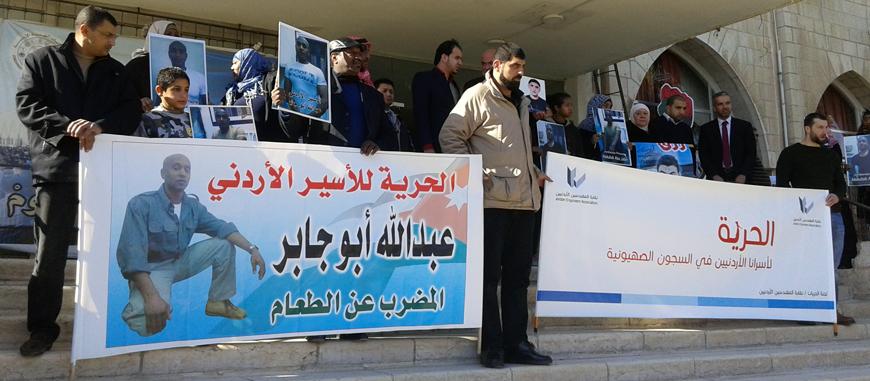You are here
Families of Jordanian prisoners protest ‘lack of public, gov’t attention’
By Merza Noghai - Jan 16,2016 - Last updated at Jan 17,2016

Activists hold a protest in solidarity with Jordanian prisoners in Israel in Amman’s Shmeisani area on Saturday (Photo by Merza Noghai)
AMMAN — Families of Jordanian prisoners in Israel and activists on Saturday organised a solidarity sit-in mainly dedicated to Abdullah Abu Jaber who has been on hunger strike for 68 days.
At the event, held by the Jordan Engineers Association (JEA) in front of the Professional Associations Complex in Shmeisani, Mohammad Abu Jaber said his brother Abdullah began his strike after the "Jordanian embassy in Israel failed to meet his demands".
The 40-year-old prisoner wants the Jordanian authorities to work on his release or move him to the Kingdom to spend the last third of his prison term, in addition to arranging a visit for his family.
"Abdullah's health is getting worse day by day, and officials are not paying enough attention to prisoners' issues," Mohammad charged, noting that his brother previously went on a 20-day hunger strike to draw attention to the same demands.
The Foreign Ministry has reiterated that it follows up on the conditions of all Jordanian prisoners in Israel, through the embassy in Tel Aviv.
Speaking at the event, attended by around 50 people, Akram Abu Zahrah's mother said her son completed his 14-year prison term last Thursday, and was scheduled to be released and arrive in Jordan, but he did not.
"Israeli authorities transferred Akram from Magedo prison to an immigration court, then to the deportation department, and we don't know what happened after that," the mother said, blaming official and private institutions for not following up on prisoners.
She said she was at the border crossing from 9am until 11pm waiting for Akram to arrive; and when he did not, she contacted officials at the Foreign Ministry who told her Israel had not informed them of Akram's release.
JEA Vice President Khalid Abu Rumman deplored the lack of official action on Abdullah's case and wondered about the silence of the Parliament and the public on prisoners' issues, calling on local and international human rights institutions to play a role in securing Abdullah's release.
"I also wonder how a freed prisoner needs a permit from the government to be allowed entry into the Kingdom," Abu Rumman said, in reference to Abu Zahrah's situation.
Mazen Malasah, head of the JEA's freedoms committee, called on the government to exert more efforts on prisoners' issues in general and Abdullah's case in particular, noting that he holds a Jordanian national number and enjoys all the rights stipulated in the Constitution.
Last month, Malasah said there are currently 26 Jordanian prisoners in Israel and 30 missing.
Related Articles
AMMAN — The Israeli prison administration has told Akram Abu Zahrah's lawyer, Arwa Hulihil, it will hand him over to the Jordanian authoriti
AMMAN — Jordanian prisoner in Israel, Akram Abu Zahrah, has been on hunger strike since January 23 and started refusing water on Saturday, p
AMMAN — The committee of the families of missing and imprisoned Jordanians on Tuesday organised a solidarity sit-in with Jordanian prisoners












